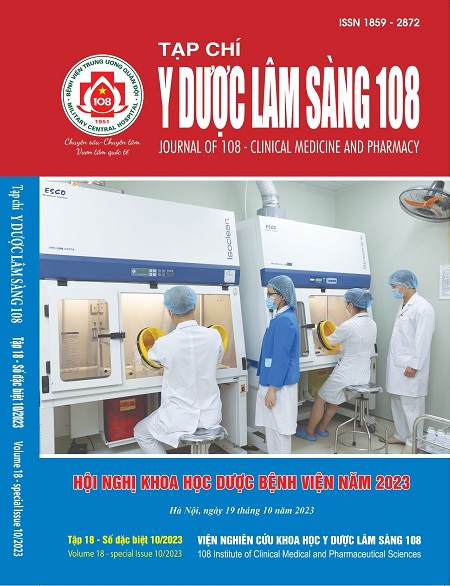Impact of the dosing alert based on clinical decision support system at Friendship Hospital
Main Article Content
Keywords
Abstract
Objective: To investigate the impact level of dosing alerts based on the clinical decision support system (CDSS) in Friendship Hospital. Subject and method: A retrospective cross-sectional study collected data on dosing alerts reported for patients at Friendship Hospital during the last six months of 2022 at Friendship Hospital. Result: A total of 6006 dosing alerts were documented. The prescriptions that triggered dosing alerts when ordered accounted for 1.7%. Among the alerts, 52.1% were recommended to avoid certain medications due to patients’ kidney function. There were 24 departments that recorded alerts when prescribing, most of which were in the Internal Departments. The substances that triggered dosing alerts most frequently were: trimetazidine, alfuzosin, rosuvastatin, amoxicillin/clavulanic acid, and metformin. The acceptance rate of dosing alerts was 34.1%. Conclusion: Dosing alerts based on CDSS displayed potential for reducing the rate of inappropriate drug-dose prescriptions. However, strategies to enhance the acceptance rate of alerts among clinicians are necessary.
Article Details
References
2. Lê Thị Bạch Như, Phạm Văn Huy và cộng sự (2022) Tác động của hệ thống hỗ trợ quyết định lâm sàng trong việc hiệu chỉnh liều thuốc trên bệnh nhân suy thận điều trị nội trú tại Trung tâm Y tế huyện Yên Phong. Tạp chí Y Dược lâm sàng 108 số 4, tr. 128-136.
3. Ashcroft DM, Lewis PJ, Tully MP, Farragher TM, Taylor D, Wass V, Williams SD, Dornan T (2015) Prevalence, nature, severity and risk factors for prescribing errors in hospital inpatients: Prospective study in 20 UK hospitals. Drug safety 38: 833-843.
4. Berner ES (2007) Clinical decision support systems. Springer.
5. Bobb A, Gleason K, Husch M, Feinglass J, Yarnold PR, Noskin GA (2004) The epidemiology of prescribing errors: The potential impact of computerized prescriber order entry. Archives of Internal Medicine 164(7): 785-792.
6. Cavell GF, Mandaliya D (2021) Magnitude of error: A review of wrong dose medication incidents reported to a UK hospital voluntary incident reporting system. European Journal of Hospital Pharmacy 28(5): 260-265.
7. Gabardi S, Abramson S (2005) Drug dosing in chronic kidney disease. Med Clin North Am 89(3): 649-687.
8. Seidling HM, Schmitt SPW et al (2010) Patient-specific electronic decision support reduces prescription of excessive doses. Quality Safety in Health Care 19(5): 15-15.
9. Stultz JS, Porter K et al (2014) Sensitivity and specificity of dosing alerts for dosing errors among hospitalized pediatric patients. Journal of the American Medical Informatics Association 21(2): 219-225.
10. Walsh KE, Landrigan CP et al (2008) Effect of computer order entry on prevention of serious medication errors in Hospitalized Children. Pediatrics 121(3): 421-427.
 ISSN: 1859 - 2872
ISSN: 1859 - 2872
